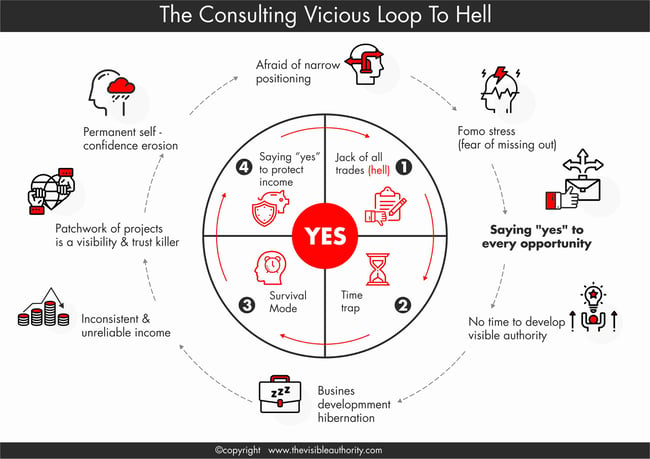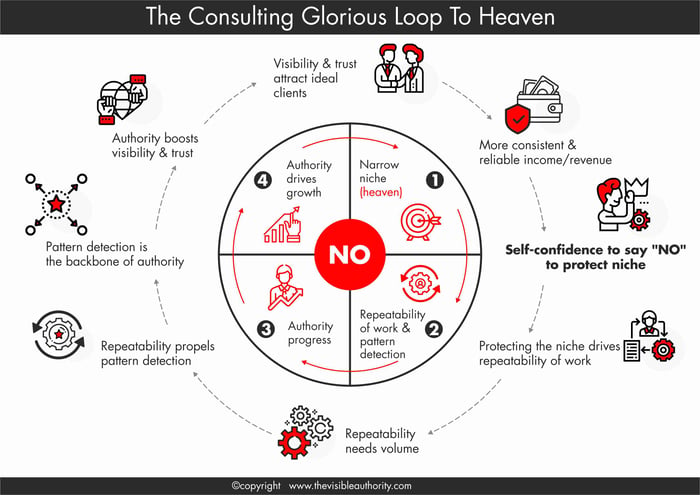
Why You Should Learn To Say 'No' To Grow Your Consultancy Business
.jpg?width=56&name=francescorizzato8%20(1280px).jpg)
In a world full of opportunity, we need to overcome our deep-rooted need to respond to everything.
Several years ago, I was called in by a large corporate client to discuss an extremely complex analysis we had never done before. It fell far beyond our capacity and capability at that time. In order to properly do the analysis, we even had to search for external experts.
I should have said ‘No’ to this request because it caused huge amounts of stress, endless internal discussions, and frustrations about the focus in our business. For several months, we weren’t actually focused on growing our existing business; rather, we were over-stretched and had gone too far out of our lane.
But I didn’t say ‘No’ because it was an existing client that I was afraid to disappoint.
To be honest, I was afraid of missing out on ANY opportunity - even the wrong and low ticket ones - because saying ‘No’ would have felt like surrender.
After I left the client meeting, I called the office and proclaimed, “Imagine what I have sold!” I was so proud to sell such a complex, robust project.
In the back of my mind, I was nervous that this would backfire, and the silence on the other end of the line confirmed that my anxiousness was warranted.
I had over-promised on what we could produce. My tremendous pride made me sell beyond our capacity. And despite the fact that most lessons are learned outside of the comfort zone, it took our focus away from our area of expertise and landed us in a lot of hot water.
It didn’t help us at all in deepening our core expertise, and it was killing crucial business development time.
FOMO is a Five-Headed Monster
In a world full of opportunity, we need to overcome our deep-rooted need to respond to everything. We need to be ruthless in discerning what is important and what is just noise.
I’ve seen many consultants fear saying ‘No’ to ill-suited opportunities in order to please a client (and earn an income), compromising their market credibility and ultimately seriously compromising their future consulting growth.
If you are able to defeat your own FOMO demon and establish laser sharp positioning (read: niche), it’s my experience that you’ll be able to carve out 15-20 hours from your schedule each month!
Imagine what you could do with an extra 15-20 hours every month from an expertise-deepening and business development standpoint.
Let me help you to fully understand the five-headed FOMO demon so that you can start to beat this monster.
1. FOMO is a vicious loop to hell
Having a proper time strategy is critical to growing your company. Having enough time to do everything you need to do is the outcome of looking at time in a dramatically different way.
Constantly responding to your FOMO is a vicious loop that will drag your consulting business down.
If you are always saying ‘Yes’ to your clients, you’ll end up engaging in far too many activities, and you won’t have the time you need to dedicate to your top priorities, deepen your expertise in your niche, and build authority.
Here’s what I call 'the vicious loop to hell':
- If you can’t say ‘No,’ you won’t have enough time to build your visible authority
- If you don’t build your visible authority, you won’t grow your consulting business
- If you aren’t growing your business, you’ll have to say ‘Yes’ to everything to (try to) make an income
If you say 'yes' to everything, you're one of those 'other' x million consultants, invisible, commoditized, with low rates and an unpredictable future!

Picture: The Consulting 'Vicious Loop To Hell' (saying 'yes' to every opportunity)
2. FOMO is a self-confidence assessment
When I talk about the dangers of FOMO, almost everybody can relate to it, understand it, and know where it’s coming from. Yet, strangely enough, the majority of the consultants I’ve met in the past were suffering from it in one way or another. Why?
Simply put, it’s because of their lack of self-confidence to be able to build a business in a narrow niche.
Most consultants struggle to hone in on their expertise and build a unique niche in order to stand out as an expert in a market or expertise domain because it’s a scary exercise. It requires a lot of self confidence and guts to turn a narrow positioning into a compelling business model.
Trading time for money is what most consultants do. They get ‘body-shopped’ by their clients.
I call that ‘undercover consultancy’ for those who struggle to shape and sell value (and are afraid of not having an income or not achieving the targets in their big consultancy firm) on the basis of a narrow market positioning. FOMO This is the fastest way to becoming commoditized as a consultant.
3. FOMO is an ego touchstone
In my early consulting years, I (also) struggled to say ‘No’ because it felt like surrender.
Every new opportunity felt like an attractive business challenge I needed to crush.
The call for help from (new) clients made me feel like a hero. My ego-driven adrenaline told me: go get it, Luk!
We don’t intentionally develop an ego; rather, it develops gradually, often to a dangerous degree as a result of success. And, at the end of the day, our ego can become the biggest enemy to our success.
Our ego is detrimental to narrowing our positioning, focusing on our single biggest mastery, and refusing all other inadequate work.
Big egos can’t say ‘No’ because they are more in love with opportunity than with deepening their expertise. (David C. Baker)
A great book to read from my favourite author Ryan Holiday (his website): 'Ego is the Enemy'
4. FOMO is a credibility killer
How can you ever be a credible expert if you are piggy-backing on all sorts of expertise domains?
Many consultants struggle to translate their expertise into an easy-to-understand, credible message. When a consultant covers multiple domains, it’s impossible to establish himself as an expert in any of them.
Without a clear message, a consultant can never get the right connection with their target clients, and it leads to poor relevance and visibility in Google. Google favours relevance (Google is calling it E.A.T.: Expertise, Authoritativeness, Trustworthiness).
In order to better connect with your clients (both off- and online), you have to niche down and demonstrate that you’re an expert in a single, narrow area. In a way, Google is encouraging us to become more and more specialized in order to become and remain relevant.
To be relevant means to be the Go-To expert for ‘something’. Clients are searching for subject matter experts and trusted advisors to help solve their problems.
Clients have more options today than ever before - there are more consultants and experts and advisors than there ever have been in the past and buyers can find anything in seconds. Will you pop-up on the first Google page?
Instead of striving for variety (consultants love variety!), focus on building the deep and unique competence that clients are looking for and are prepared to pay a premium for.
5. FOMO obstructs expertise improvement
Most consultants don’t really understand that saying ‘No’ is the biggest force for building their business. So why is saying ‘No’ so difficult?
The biggest authorities in the world relentlessly say ‘No’ in order to protect and maintain their narrow positioning.
The difference between successful people and very successful people is that very successful people say no to almost everything. (Warren Buffet)
Authorities are obsessively protecting their narrow positioning (or focus area).
Here's what I call 'the glorious loop to heaven':
- Narrow focus is needed to propel repeatability
- Repeatability is the driver of pattern detection
- Pattern detection is the backbone of authority progress.
 Picture: The Consulting 'Glorious Loop To Heaven' (saying 'NO' to non-ideal opportunities)
Picture: The Consulting 'Glorious Loop To Heaven' (saying 'NO' to non-ideal opportunities)
Every consultant should read this book to understand narrow focus, repeatability and pattern detection: 'The Business of Expertise' from David C. Baker!
This is the ultimate loop that will help you to establish yourself as a visible authority and renowned consultant in your narrow field.
These are some of the outcomes I've been privileged to experience myself the past years as a visible expert in my industry:
- Rates - Ability to negotiate premium rates
- Pricing - Easier use of value-based pricing, often supported by productized consulting services
- Value - Higher average engagement value and longer lasting client relationships & projects
- Upstream - More upstream (strategic) instead of downstream (implementation) projects
- Access to more clients and a more consistent flow of new client leads
- Pre-Qualification - A more organic pre-qualification of clients, as a result of clear (and sometimes bold) positioning
I wrote a blog post with my own experiences from the past years: 'The Surprising Results Of Openly Sharing All My Expertise As A Consultant'.
5 ways I keep my FOMO threat in control:
1. I have a clear 3-5 year outlook
I have been able to get incredibly clear about my business plan and my area of expertise, and I stick to it. Period. I do not change lanes, I do not waver. I know my strengths, challenges and experience, and I have a laser-sharp focus on these things only.
I can easily say ‘No’ to clients outside of my well-defined lane, and I can spend much more time with niche-matching clients (I have clearly defined my ideal client profile, and I thoroughly discuss this with potential clients upfront before saying ‘Yes’ to collaborating).
2. I rewired my brain
To refrain from unconsciously saying ‘Yes’ to new business opportunities, I’ve made a vicious circle picture as my desktop screensaver. This way, I have it as a daily reminder.
I am convinced that the fear to say ‘No’ (because of income, ego, pride, etc) is the biggest self-destructive behaviour, and I don’t want that fear of saying ‘No’ to unconsciously push me into a time trap of not having enough time to grow my business.
The #1 rule for success is focus. Do less. Pick one thing and do it 100%. Don't let anything distract you. Say no. Say no. Say no. (Ev Williams, founder of Medium)
I don’t want it to drag me into a revenue slump of inconsistent and unreliable income, and I don’t want it to keep me awake at night worrying about the choices I have made. You, too, should develop strategies to rewire your unconscious brain!
3. I trimmed all the fat
Because I have created clear positioning for myself, I am able to trim the fat around the things I consume.
For example, I mentioned in a previous article that I like to read a lot. With my positioning and detailed business plan as my guide, I only read those things that are relevant to deepen my expertise and achieve my goals in the next 3-5 years.
Once I had a crystal clear niche, a precise expertise definition, and rock-solid business intentions, I was able to narrow down all my areas of focus: reading, studying, writing, presenting, speaking, expertise deepening, commercial offering, pricing, etc.
It’s easy to say ‘No’ to the wrong things when you have this much clarity in the positioning of your expertise.
4. I will never again get into commoditized consultancy horror
In a world where professional services buyers act like consumers and can find anything in seconds, whether searching for a new pair of shoes or for an expert to solve their business problem, how the heck will we stand out and get on the first page of Google for that buyer?
I am convinced that commoditization of consultancy is already happening and will put us all at risk if we remain afraid of specializing (thus, afraid of saying ‘No’).
I am using experts from Germany (business modelling), Hungary (social media management), Ireland (video post-production), USA (content strategy and writing), UK (client interviewing, persona development, and text proofreading), Spain (marketing automation), and India (CRM & CMS management) to set up and run my business. Those high performing experts are only two clicks away. Half of them, I’ve never even met.
Conclusion
- Narrow down microscopically to grow your authority (and your business)!
- Rewire your brain to love 'the glorious loop to heaven' (and have enough self-confidence)
- Learn to consistently say 'no' to save 20-30% of time to build your visible authority
I am no longer afraid to narrow down in order to grow.
This seems like a huge contradiction for many consultants: how are you supposed to grow by doing less? The Jack of All Trades has no chance to survive. You either specialize and stand out in the very crowded consulting market or you’d better start looking for a regular job.
Saying ‘No’ to 95% of things empowers me to say ‘Yes’ to only the right things and, as a result, massively deepen my expertise and carve out time to strive for smart visibility in the market.
I’m extremely selective about which distractions and which content I allow myself to consume. They all have to fall in line with my overall master plan. I encourage you to take a deep look inside yourself and maybe set the 3 “glorious loop to heaven” bullet points as your desktop screensaver:
Focus leads to repeatability leads to pattern detection leads to authority! (Thanks to David C. Baker for educating us)
If you have questions, reach out to me and let's find out together how you can get rid of your FOMO stress.
Interested in receiving all my learnings to become a better consultant? No spam, no BS. Pure teaching! Subscribe to my newsletter.
.jpg?width=66&name=francescorizzato8%20(1280px).jpg)
Luk’s extensive career in the consulting business, which spans more than 20 years, has seen him undertake a variety of influential positions. He served as the European CHRO for Nielsen Consulting (5,000 consultants in the EU), founded iNostix in 2008—a mid-sized analytics consultancy—and led the charge in tripling revenue post-acquisition of iNostix by Deloitte (in 2016) as a leader within the Deloitte analytics practice. His expertise in consultancy performance improvement is underlined by his former role on Nielsen's acquisition evaluation committee. After fulfilling a three-year earn-out period at Deloitte, Luk harnessed his vast experience in consultancy performance improvement and founded TVA in 2019. His advisory firm is dedicated to guiding consulting firms on their path to becoming high-performing firms, drawing from his deep well of consulting industry expertise and financial acumen.

